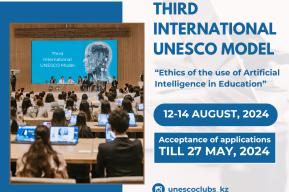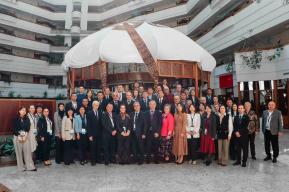Article
Fighting Climate Change with the AI for the Planet Alliance

Applying AI to climate challenges is an important way to make meaningful change at this critical moment. AI for the Planet, a newly formed neutral and international alliance to drive AI solutions for climate change at scale, seeks to catalyze global efforts in this domain through research and advocacy. UNESCO in cooperation with the United Nations Development Programme (UNDP), the UN Office of Information and Communications Technology (OICT), and the AI for Good Foundation along with Startup Inside, Boston Consulting Group (BCG) and BCG GAMMA aims to work with a multidisciplinary and multistakeholder group of AI and climate leaders to drive concrete and measurable action.
Climate change is one of the biggest challenges humanity faces. UNESCO will assist in empowering countries to effectively use AI and emerging technologies to mitigate and adapt to climate change - from enhancing knowledge exchanges between countries to assessing the risks of natural disasters and monitoring the effects of climate change through open, inclusive, and multistakeholder processes.
Among AI for the Planet’s primary objectives is establishing a global platform to:
- Identify and prioritize the top use cases for AI in addressing climate change, such as accurately measuring emissions;
- Select and champion the most promising solutions to address climate change mitigation, adaptation, and resilience, especially in the Global South;
- Ensure these solutions can achieve impact at scale, with actions like forming connections with investors, and public and private decision makers driving climate action on the ground.
How AI Can Be Used to Mitigate Climate Change
By gathering and analyzing complex datasets on emissions, climate impacts, and more, AI can be leveraged to help all stakeholders—from policymakers and NGOs to corporations and investors—take a more informed and data-driven approach to building a greener and more resilient society.
- AI can be used to play an important role in climate adaptation and resilience efforts by gathering and analyzing large datasets in real time, leading to the creation of early warning systems for extreme weather events, and long-term projections of localized events such as sea-level rise. This will be especially vital for the over three billion people living in areas highly vulnerable to climate change, particularly in the Global South.
- AI can be used to help with research and education efforts by modeling climate feedback loops that help decision-makers explore the intended and unintended effects of climate-related policies and decisions.
- AI can be used to accelerate efforts to mitigate climate change by optimizing supply chain networks to simultaneously reduce the energy needed and the costs incurred to ship people and cargo around the world; as well as improving energy grid operations by helping forecast electricity demand.
The risk of climate change impact is disproportionately higher for people who are already living in vulnerable situations. UNDP is looking forward to being part of this coalition, as there are opportunities for shaping the direction of AI technology. It is about coproducing and codesigning the technology together with the people who are the most in need.
Over the next 12 months, AI for the Planet will be publishing a report analyzing the use cases for AI in climate change, launching a call for solutions to identify and support promising innovations in climate AI, and organizing a global conference to drive further action.







